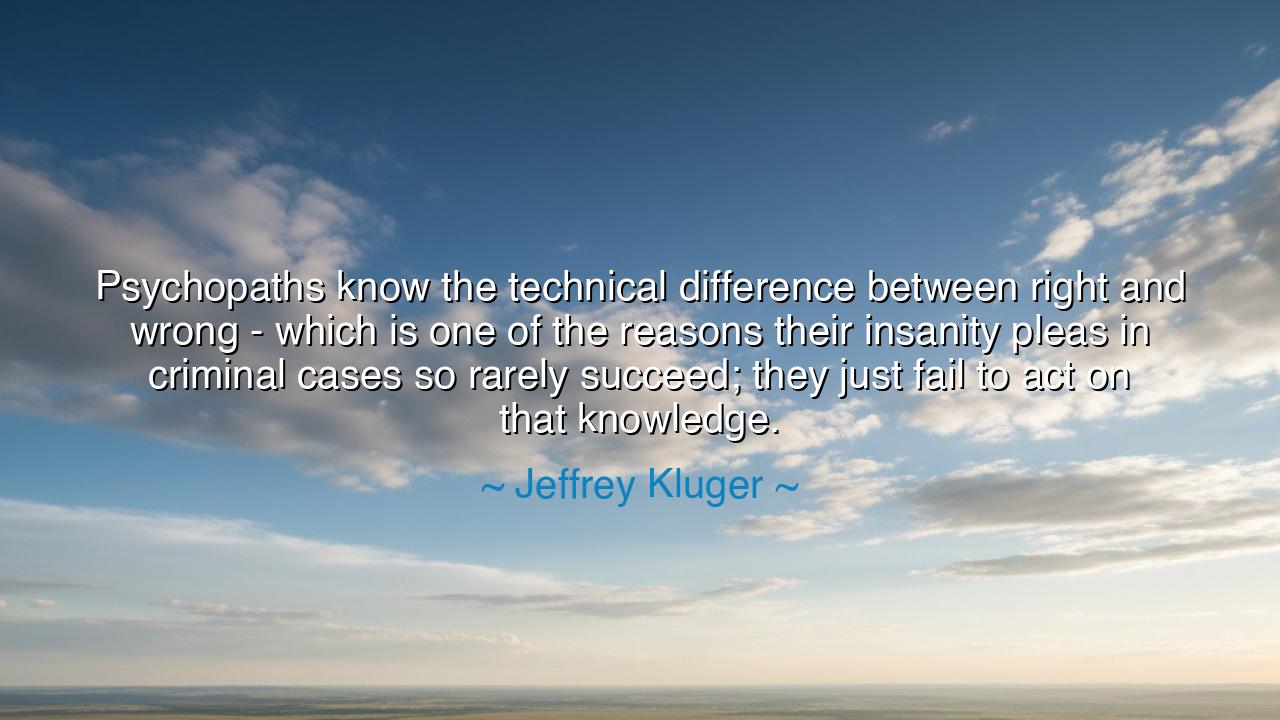
Psychopaths know the technical difference between right and wrong
Psychopaths know the technical difference between right and wrong - which is one of the reasons their insanity pleas in criminal cases so rarely succeed; they just fail to act on that knowledge.






“Psychopaths know the technical difference between right and wrong — which is one of the reasons their insanity pleas in criminal cases so rarely succeed; they just fail to act on that knowledge.” — Jeffrey Kluger
In these darkly illuminating words, Jeffrey Kluger, the chronicler of the human mind, unveils one of the most chilling truths about evil: that it is not always born of ignorance, but often of indifference. His insight cuts deep into the nature of psychopathy, that shadowed realm where knowledge of morality exists — yet the heart remains unmoved by it. The psychopath knows the law, understands morality, can define virtue — but does not feel it. Here lies the abyss between intellect and conscience, between knowing and caring, between understanding right and choosing wrong. Kluger’s words remind us that wisdom without empathy is a sword without a sheath — sharp, brilliant, and utterly destructive.
The origin of this quote lies in Kluger’s writings on psychology and human behavior, where he sought to explain why certain individuals commit acts of unspeakable cruelty without remorse. His statement refers to the legal and moral dilemma that surrounds those deemed psychopathic: though they understand the moral codes of society, they are emotionally incapable of being guided by them. In the eyes of the law, such knowledge removes the veil of madness; for justice distinguishes between those who cannot comprehend morality and those who simply refuse to live by it. Thus, the insanity plea — that shield of those who act without understanding — cannot protect the psychopath, for his crime is not ignorance but the betrayal of conscience.
The ancients, too, grappled with this mystery of evil divorced from reason. Aristotle spoke of akrasia — the weakness of will — when a man acts against his own better judgment. But the psychopath, as Kluger reveals, is not weak; he is empty. His knowledge is not joined with feeling, and thus it bears no fruit. In the temple of his mind, the statues of morality stand cold and silent. Plato once said that knowledge of the good naturally leads one to do good; but Kluger’s words reveal that this is not always so. For knowledge unaccompanied by empathy is like light that does not warm — it illuminates, but it cannot heal.
Consider the story of Ted Bundy, one of the most infamous criminals of the twentieth century. He was handsome, articulate, and intelligent — a man who could discuss law, philosophy, and justice even as he planned his next murder. In his final interviews, Bundy could describe morality with clarity and precision, yet he lacked the emotional compass that would anchor his knowledge to conscience. He once told an interviewer, “I am the most cold-hearted son of a bitch you will ever meet.” In him, Kluger’s observation becomes flesh: a man who knew right from wrong, yet felt nothing when crossing the boundary between them. His crimes were not born of confusion but of spiritual vacancy — the terrifying capability of reason without humanity.
Kluger’s insight, though clinical, carries profound moral and philosophical weight. It forces us to confront the uncomfortable truth that evil is not always the opposite of intelligence, but sometimes its companion. The greatest horrors of history — the camps of Auschwitz, the purges of Stalin, the genocides of Cambodia — were not the works of the insane, but of the rationally cruel. Men who designed gas chambers and starvation policies were not madmen frothing in delirium; they were bureaucrats of death, acting with calm precision, their hearts untouched by the suffering their minds could so easily justify. This, Kluger reminds us, is the truest face of moral decay: when knowledge serves power rather than compassion.
Yet his words also carry a warning to the living. Every human being carries within a spectrum of reason and emotion, of intellect and empathy. When we allow intellect to grow while neglecting compassion, we begin, in small degrees, to resemble the psychopathic state. To know good is not enough — one must practice it, embody it, let it live in the marrow of one’s choices. It is not enough to recite moral codes or quote the sages; morality must be felt in the blood, must rise unbidden when we see pain or injustice. The tragedy of the psychopath is that he has severed the bridge between mind and heart — a fate that any society courting cold efficiency risks sharing.
Let this, then, be the lesson drawn from Kluger’s words: that knowledge without conscience is a ruinous power, and understanding without empathy is the seed of destruction. Cultivate wisdom, but anchor it in love. Sharpen your mind, but never at the expense of your humanity. The laws of men can punish evil deeds, but only the warmth of the heart can prevent them. For when intellect stands alone, unguarded by compassion, it becomes not the servant of good, but the architect of cruelty.
So, O seeker of truth, remember: to know right and wrong is the beginning, not the end, of morality. Let your knowledge be tempered by mercy, your logic by love, and your justice by empathy. For as Jeffrey Kluger warns, the line between the learned and the lost is not drawn by intelligence, but by the capacity to care — and it is that capacity which keeps humanity from becoming monstrous.






AAdministratorAdministrator
Welcome, honored guests. Please leave a comment, we will respond soon